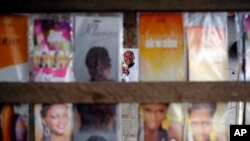After a tour of various provinces in Ivory Coast, incumbent President Alasanne Ouattara is visiting neighborhoods of Abidjan, the country's biggest city, during the last few days of the electoral campaign.
Ouattara, seeking a second five-year term in Sunday's election, said his track record during his first term speaks for itself. He said that he fixed the issue of water shortages in Abidjan in 3½ years and that the nation's achievements in health and education were evident to all.
The poll is crucial for the country, as postelection violence in 2010 between supporters of Ouattara and of then-President Laurent Gbagbo killed more than 3,000 people. Ultimately, Gbagbo was arrested and Ouattara became president.
Ouattara is heavily favored to win the election. He is backed by one of the country's biggest parties, the PDCI, and he faces a divided opposition.
Ouattara's main contestant is Pascal Affi N'Guessan, the official candidate of the Ivorian Popular Front, Gbagbo's party. But some pro-Gbagbo hard-liners within the party resent him for taking part in the elections and have called for a boycott of the elections unless Gbagbo, who is awaiting trial at the International Criminal Court, is released.
Earlier this week, N'Guessan tried to reconcile the party's divergent factions. He said would win the elections, form a government and get Gbagbo out of jail.
From his prison cell, Gbagbo said he was not endorsing any candidate in the election.
Other opposition candidates claim the conditions have not been met for a free and fair election. Among other things, they say that the voter list contains double-listed names and that the electoral commission is biased in favor of Ouattara. Two candidates already have pulled out.
But the electoral commission insists its goal is to have peaceful elections.
The country is expecting 7,000 local and international election observers around the country.





